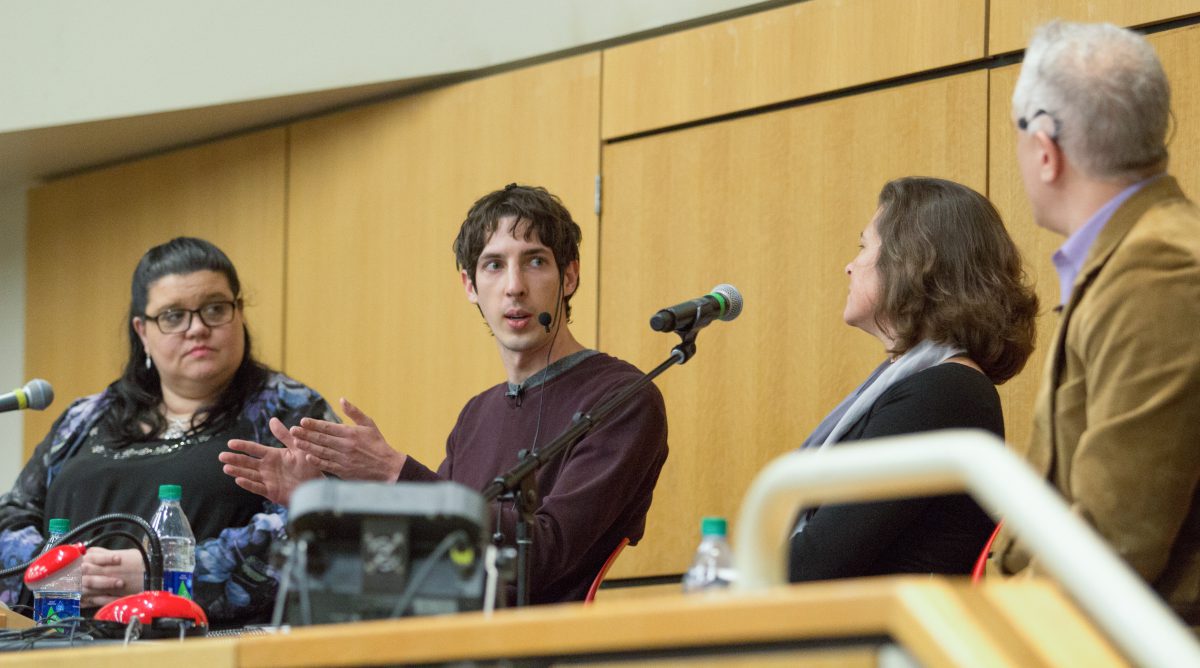Education
Damore, Diversity, and Disruption at PSU
Organizing a student event to discuss any topic — including diversity — should not be a safety hazard.

I held my breath as the protesters stood up and began their walk-out. “Please, let it be peaceful,” I said to myself. In the weeks leading up to the event, we had received threats of violence. One person on social media said he would bring explosives. The university administration found the threats credible enough to send a team of armed campus police to patrol the lecture hall. As the protesters neared the exit, a woman suddenly lunged for the audio equipment, pulled leads out indiscriminately, and knocked some of the equipment to the floor. The microphones stopped working. Another protester shoved a student volunteer into the door.
What caused this extreme reaction?
Ex-Google engineer James Damore had been invited to speak as part of a panel discussion on diversity, held at Portland State University on February 17. As I had previously written in the Wall Street Journal, we were anticipating controversy. After the incident, however, the disruption and violent misconduct were downplayed. Willamette Week, a left-wing alternative newspaper, was dismissive: “[The Freethinkers] expected controversy. They warned of violence. None arrived.” Perhaps not the kind of violence that had been threatened, but there was intentional “criminal mischief,” hundreds of dollars in property damage, and unnecessary disruption lasting just over four minutes (not the 30 seconds the Willamette Week incorrectly reported).
I belong to Freethinkers of PSU, the skeptic student group that organized the event and was responsible for inviting Damore. To correct the record, we didn’t warn of violence; those who threatened us did that. The paper’s scornful editorial surprised me, particularly given the timing of the event. Only days earlier the nation had learned that the Florida school shooter’s violent social media threats hadn’t been taken seriously. We weren’t about to take any unnecessary chances and nor were the campus police. Organizing a student event to discuss any topic — including diversity — should not be a safety hazard. In the present climate, however, security measures have become a regrettable necessity.

A protest campaign to hoard free tickets claimed more than half the seats, suppressing turnout. Nevertheless, surrounded by officers and protected by an entourage of private security, James Damore spoke to an audience of 270 people. He was joined on the panel by former Evergreen State professors Heather Heying and Bret Weinstein, PSU philosophy professor Peter Boghossian, and critic of third wave intersectional feminism Helen Pluckrose.
Explaining what had moved him to write the “Google memo,” Damore said that he found the analyses of the company’s sex disparity, offered during a conference on diversity and inclusion, to be unsatisfactory. “They went through these different things, like microaggressions and unconscious bias, and said that is why we only have 20 percent women,” he recalled.
After the conference, Google solicited feedback from staff. Damore obliged with a ten page document entitled “Google’s Ideological Echo-Chamber,” in which he argued that sex differences on average may help explain the male/female disparity at the company. He also offered suggestions about how the workplace environment could change to appeal to more women. But when his memo was leaked to the press and published, it was stripped of important nuance and links to supporting data, and Damore was viciously mischaracterized as a misogynist and a racist.
“James argues, accurately, that there are differences between men and women,” evolutionary biologist Heather Heying said during the panel discussion. “This is a strange position to be in, to be arguing for something that is so universally and widely accepted in biology. . .You can be irritated by a lot of truths, but taking offense,” — here, Heying paused as hecklers shouted and began to walk out — “is a response that is a rejection of reality.”
A non-student protester then yanked the cables from the sound system and shoved the equipment to the ground, breaking an antenna. She was promptly detained by police. “[Damore’s] a piece of shit!” she screamed as she was issued a citation for criminal mischief in the second degree. “Even the women in there have been brainwashed!” Another protester stated: “Nazis are not welcome in civil society.”
Undeterred, Peter Boghossian said to the audience: “Fringe elements of society do not have the right to hold you hostage.” The speakers pressed on in spite of the disruption. First Boghossian and then Heying stood and projected their voices to the back of the auditorium. “If your belief system cannot stand up to scrutiny,” Heying told me later, “it is weak, and attacking those who say so will not change that fact.” Fortunately, the sound was restored just over four minutes later.
Heying explained how variation is distributed in the sexes. “Male and female aren’t a binary but they are strongly bimodal,” she said. “We cannot change what may be true at a societal level unless we understand why things are true.”
Helen Pluckrose added that denying the existence of sex differences may paradoxically help confirm sexist attitudes. “If we are assuming that the choices men make are the ultimate, best, absolute choices, [then] we are making men the default humans,” she said. “The areas that women dominate — healthcare, education, psychology, publishing — these are all hugely influential areas on society.”
In his closing remarks, Damore said that he doesn’t regret writing the memo but conceded that using technical language from psychology literature made his writing more susceptible to misinterpretation. “There are definitely still issues of discrimination happening in many sectors,” Damore said. “[But] men and women tend to approach the workplace differently so maybe if we changed the workplace then we could actually solve the problem.”
The discussion was followed by a Q&A. A PSU alumna from the women’s studies department complained that the stage-to-audience dynamic presented an intimidating power imbalance. “You guys are high [up]. You have microphones. We don’t,” she said. “This is perpetuating the status quo in the hierarchy.” Boghossian invited her to join him at his next (stageless) panel on intersectionality the following Monday. She didn’t come.
After the event, police and security escorted the speakers out of a back entrance. I caught up with them and asked for their reactions. Helen Pluckrose recalled what one of the police officers had told her: “So why are you so radical and extreme and dangerous that I have to escort you off campus? You seemed very reasonable to me.” She still doesn’t have an answer.
Reflecting on the evening’s events, the panelists discussed how they didn’t recognize the picture of themselves that the protesters were painting. “The mob acts against a fiction of its own creation,” Bret Weinstein told me.
Our event was titled “We Need to Talk About Diversity.” On stage, Boghossian had strongly criticized the institutionalization of diversity as a mechanism to enforce ideological conformity. The current understanding of diversity, he said, demeans people and reduces them to their immutable characteristics. The panelists also discussed how ideologues have appropriated morally important terms like ‘inclusion,’ and given them different meanings. I experienced this firsthand last year when a high-level student government leader and intersectional activist confronted me on campus. He said he could not celebrate me as a person of color in higher education because of my conduct and worldview. To activists like him, diversity means color plus conformity.
No thanks. I’ll pass.
UPDATE 26 Feb: A video of the entire event is now available on YouTube.
Andy Ngo is a graduate student in political science at Portland State University. Follow him on Twitter @MrAndyNgo.






